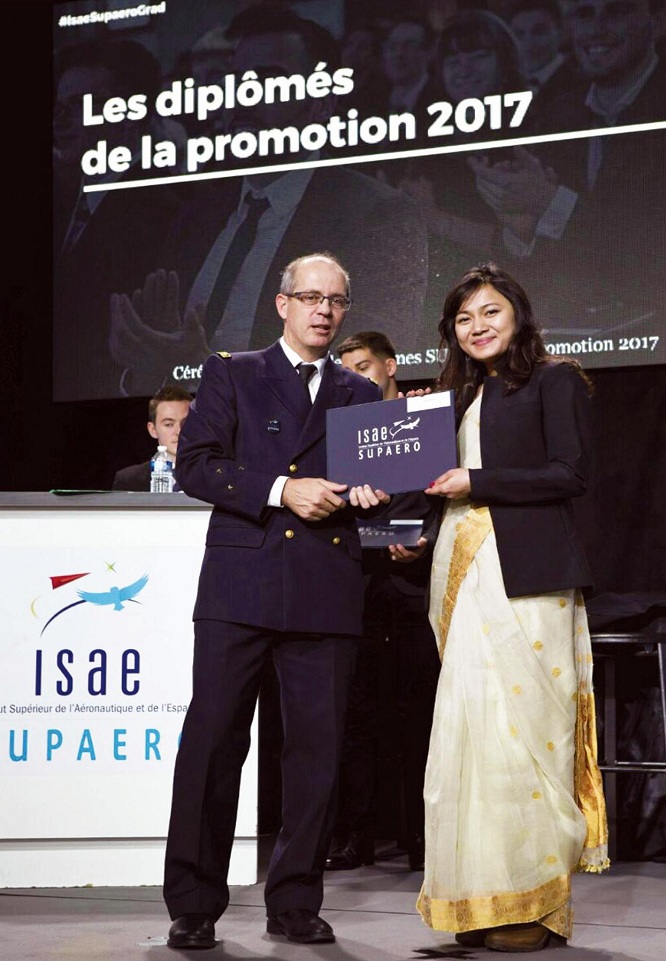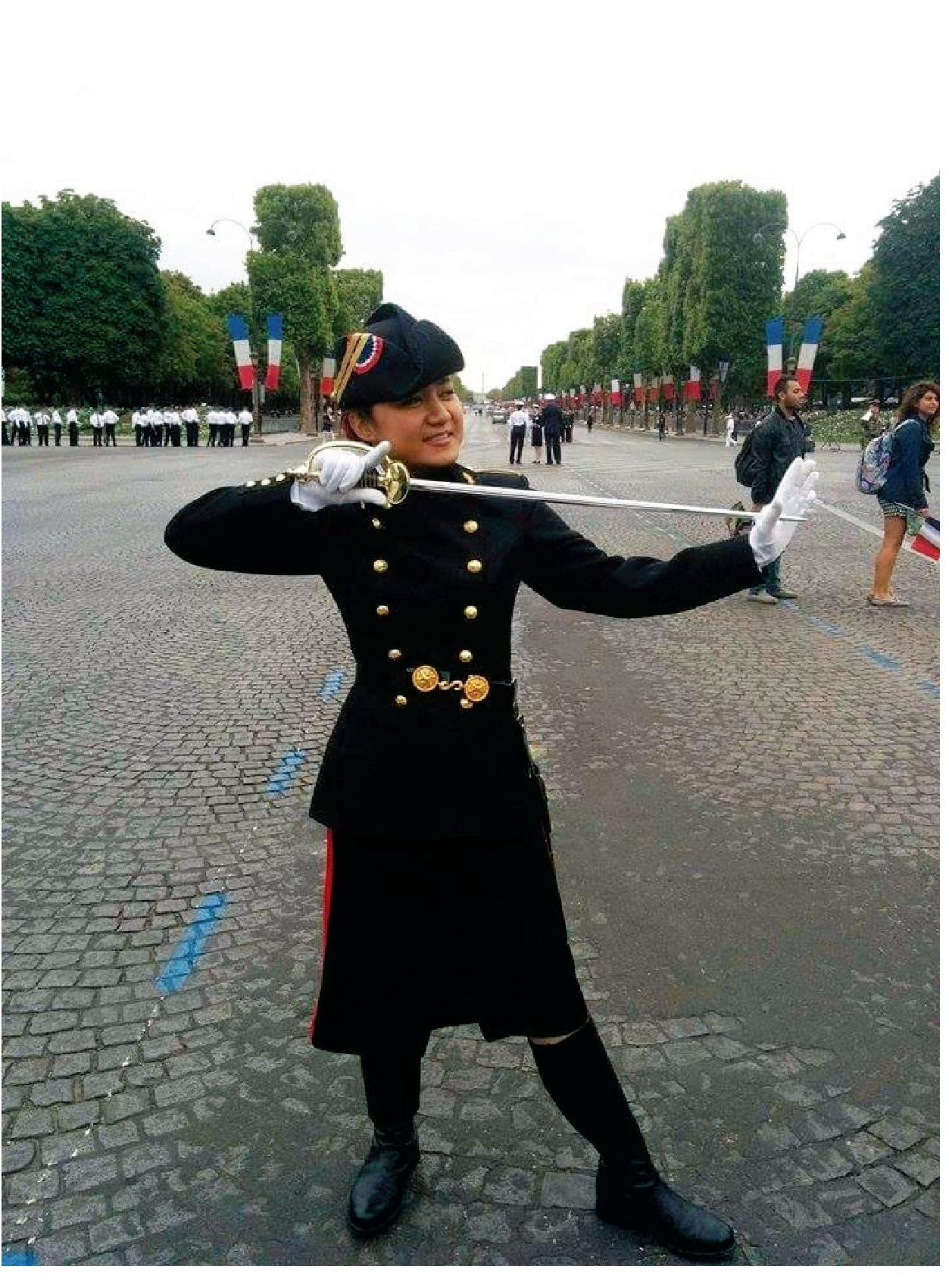Ever since I first saw the sky, I have been interested in Space. This dream has been the most effective motivating factor in my life so far; sometimes directly, for example when I put in every effort to get a chance to discover NASA's Jet Propulsion laboratory, and sometimes indirectly, like when I made the choice to do Physics over a course in art and design, my other passion. In this small article, I present my academic journey to the reader, in the hope that it might inspire some young people and show them a way of how to approach their dreams.
My parents, being from scientific professions themselves, have had a big role to play during my upbringing in helping me cultivate the quality of being autonomous - I could always approach them comfortably for just about everything but my decisions were always my own. This sort of freedom gave me a sense of control over my life so I could really aim for the stars if I so wished. However, the most important contribution from them was, at the same time as being supportive, to be strict enough that I could differentiate between what I was privileged to have and what I had to get on my own.
School life
Like a lot of children I was interested in several things at the same time. With time I started to focus on a select few of these fields - including art, myviolin, dance, writing, sports and of course, science and puzzles - but they were still too many in number to give me a direction in life, worrying my parents. However that did land me the BestAllrounder Award just before leaving school. Since I did rather well in competitive exams like the Junior Science Talent Search, and the National Science Olympiads, I felt encouraged to pursue a career in science. But deep down, I was an artist and I started getting really distracted by its nature during my teens. However, like it is in India, parental pressure made me focus on my studies again and after working really hard during my 12th boards, the hardest I have ever worked for the sake of rote learning, I secured a 95%. It served as a trampoline for me, as it secured me a place at Stephen's College for an honors course in Physics, and my adventure in the exploration of science thus began (and my mother seemingly forgave me for messing up my IITJEE exam). Itwas a difficult decision at first because the National Institute of Design (NID) at Ahmedabad had also offered me a place, but sometimes choices have to be made.
St. Stephen’s College
While at St. Stephen's, I realized that my aerospace dream could actually become a reality. I did my first summer internship at the Inter University Accelerator Centre at Delhi where I studied the focusing properties of magnetic quadrupoles on a charged beam of particles. Seeing that particle physics involved similar principles as light optics, my perspective on Physics post-school started to mature. Pursuing my newly developed curiosity for optics, the following year I did an internship at the Photonics lab at IIT Delhi, on holography, a subjectthat I became obsessed with because itwas so artistic as well as scientific. In my final year, I was selected for a summer course in experimental physics at the Homi Bhabha Centre (HBCSE) organized by TIFR Mumbai. My academic experience at St. Stephen's was thus quite rich and eventful. The fact that I turned up with very little preparation for entrance exams for masters like JAM, JEST and TIFR, and yet qualified with good ranks too showed that I had indeed enjoyed my bachelors and been a serious student. However, it did not mean that I felt satisfied as deep down I felt the need to explore more - not just academically but in what life had to offer in general.

École Polytechnique
Thus, encouraged by my professor Dr. Bikram Phookun, I jumped upon the opportunity to apply to École Polytechnique in Paris. École Poly-technique is one of the most prestigious schools in France, having produced several of the best French minds since the end of the 18thC, and it was given a military status by Napoleon himself in 1794. I mention this because people in India do not generally know much about France,exceptthat there is the Eiffel tower in Paris. Moreover, there are a lot of stereotypes about western culture that are either baseless or unimportant, and some people I know were even skeptical of the term 'Polytechnic' itself. However, if we stay stuck to what people say and believe, we would never make progress ourselves. Thus, I would like to highly encourage students to apply to French universities like École Polytechnique. My parents were a bit troubled by the fact that it was a four year course; a master normally takes two years. But as Dr. Phookun told me, two extra years hardly makes a difference when we think about a career doing what we love. Moreover, the course at Poly‑technique gave us not just one internationally recognized master in science and technology, but two of them, and the second year can be counted as a second bachelor. Thus it is quite far from a waste of time. My happiness knew no bounds when I received my acceptance letter! I had even received full scholarship and a paid flight to France. École proved to be the second major trampoline in my life. A new country, a new culture, and a plethora of opportunities. There was so much I could learn and do at the same time - I even took up fencing as a sport and competed at university level.
Space projects
Among all the cheese, travel, student associations, parties and wine great experiences when one is in their early twenties - I had not forgotten my aerospace dream. In fact it was more alive than ever. In my first year at École, I participated in an event called ActInSpace, organized by the CNES, the French Centre for Space Studies. Our team developed an origami-inspired design of solar panels around a space probe for ease of deployment in space, and won the first prize in the Paris region and made it to top 5 in France. The next year I was part of a team that made an actual microsatellite for the QB50 project, a mission for developing a network of CubeSats built by Universities teams all over the world to make a global map of the largely unexplored lower thermosphere. My work was on he communication channel between our CubeSat and our ground station. Our satellite was launched n May 2017 with the others from the International Space Station itself via the Atlas-V rocket, and it is still in orbit, transmitting atmospheric data. I have a piece of code in space!
Encouraged by the success of my projects, I jumped at the opportunity of applying to the 2015 Caltech Space Challenge, organized by the California Institute of Technology (Caltech), in collaboration with scientists from NASA's Jet Propulsion Laboratory (JPL). I really put all my effort and prayers into it, but I was still really surprised when I was named among the 32 selected from around the world! The challenge itself consisted of simulating the planning of a mission to send astronauts on an asteroid captured and put in an orbit around the moon by NASA's Asteroid Redirect Mission (ARM). It was not just all work and no play - we got a chance to visit JPL, play beer pong with NASA scientists, and have a good time! The experience overwhelmed me from a scientific perspective as I realized I was too young and inexperienced to be of any important service to an organization like NASA. This was when I decided that I needed to either do a PhD or work as a research engineer.
Brazil and Robotics
I did a research internship in my third year at the University of Sao Paulo in Brazil. Needless to say it was another opportunity to experience a different culture at the same time as delving deep into a scientific field. I have always had a deep interest in Computer Science as it is a very versatile field with applications in every field, which is evident when we look at the way the world is becoming more technology based. I was starting to get interest in Artificial Intelligence (AI) and Autonomous Systems. My third year specialization, and thus my first master degree from École Polytechnique, was in Data Science. In Brazil, I worked on a Real-time Indoor Localization System (RTILS), where I trained a system of trackers for automatically and fast localizing a robot with high precision using a particle filter. This internship also gave me a taste of the domain of autonomous navigation. By the end of the third year, I was looking for a PhD that would combine navigation, satellites, machine learning and AI, and give me some opportunities to travel and practice my art.
Supaéro and PhD
During my first year at École, I had learnt thatthere was a possibility of doing our 4th year as a double diploma exchange student at ISAE-Supaéro, France's top school in the domain of aerospace. When they came to present themselves at École Polytechnique, they took us on a visitto the campus of Safran, a leading aerospace company in Europe.
There, we were greeted by Jean François Clervoy, an alumnus of both Polytechnique and Supaéro ... and a French Astronaut for the European Space Agency (ESA)! I had then a deep desire to study at Supaéro and one day work for Safran. As life turned out, I got accepted at Supaéro from where I recently earned my second master, in Aerospace Engineering with a specialization in Autonomous Systems, Decision Sciences and Robotics, and thereafter through a recruitment process, I got accepted for a PhD in collaboration with Safran.
So here I am, writing this article from my office computer at Safran. There are numerical simulations open on the other windows nearby. My PhD, to explain briefly, is on studying the navigation signals from satellite systems (like GPS) and fusing them with other physical navigation devices so that we can have a robust solution for a super precise position, of the order of centimeters. The GPS we use today from our phones is rarely more precise than at least a few meters. My research could have applications in autonomous cars and planes where a few centimeters can make the difference for survival. Thus, I managed to get the PhD I had been wishing for, and now I strive to continue to pursue my Space dream!
In conclusion
Thus I conclude my article on my journey; however one cannot truly summarize a decade's worth of experiences, even of a young person, in a few paragraphs. If I made some things look easy, it's because I have not spoken of the constant effort I had to put in - the countless emails I wrote, the amount of care I had to take to be aware of a maximum number of things going on without being overburdened by information, the effort it took to stay motivated when I was faced with failure and rejection, learning to move on to new things, learning to overlook embarrassment and gain confidence, even health problems, and the very general questions we face in our personal lives just because we are human. On the contrary if I made some things look difficult, I would just like the reader to realize that if you stop blindly obeying everyone, think with your heart and have the courage to act on your own instincts, nothing is truly impossible. Perhaps extremely difficult, but definitely not impossible.
- 46322 reads










Add new comment